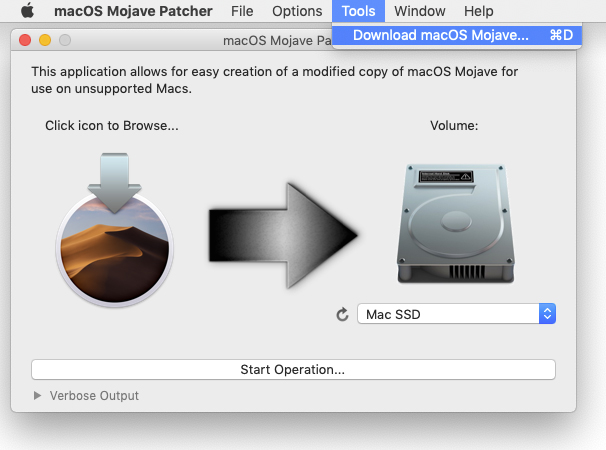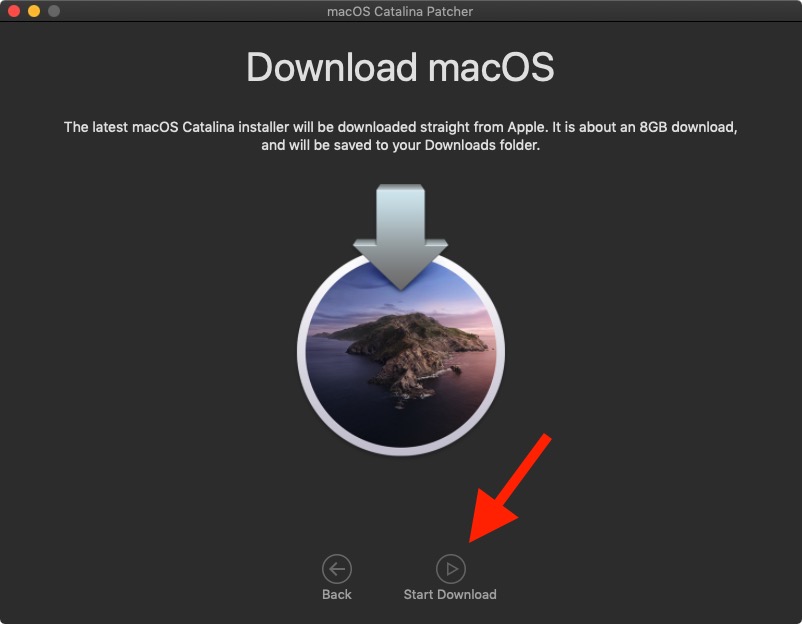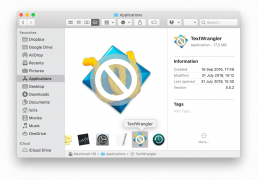Upgrade Unsupported Mac To Catalina
“Tried to upgrade my Mac Mini as well last night, and when it opened up, Finder would crash every single time, and no programs would open. Made a bootable USB installer of Catalina, and it did. In addition, Catalina also includes support for Apple's Screen Time tracker, an upgraded Photos app, and revamped tools for managing your files, including support for using Google drive on your Mac. Unfortunately, these features aren’t available for everyone since Apple doesn't allow you to install Catalina on older machines. Unfortunately, Mac wouldn't be Apple if it were that easy;). You'd need to create a new El Capitan (or maybe even the Catalina itself) bootable USB (in which case, you'll need access to another Macbook, at least for a couple of hours, depending on your internet speed. If so, you will need to upgrade or replace them. See: 32-bit app compatibility with macOS High Sierra 10.13.4 and later - Apple Support. Also, before you upgrade you might want to start a new post about the problems you are having currently with Catalina to see if someone can help with that. An upgrade may not solve those problems. But Migration Assistant has its limits: in Catalina and Big Sur, you must migrate from a backup made from or a computer running Mac OS X 10.11 El Capitan or later. Attempts to copy from older.
Catalina (10.15) is the latest stable release of Apple's macOS. You will see some of the recent apps can only work on this version. And you have to upgrade macOS accordingly. However, only a small portion of Mac models are eligible for direct upgrade offered by Apple. What 's to do if you want to use Catalina on an unsupported Mac? This tutorial will show you how to install macOS Catalina on an unsupported Mac model.
1. Why macOS Catalina?
macOS Catalina is the last iteration of the macOS series, after which Apple has now moved to macOS 11 Big Sur. Not all Mac users will install Big Sur so soon after its release because they'll be waiting for all the major bugs to be fixed in an 11.x update. But there's also another reason: Big Sur is only meant for certain models of MacBooks and iMacs.
And some of the apps can not work on an old version of macOS, such as High Serria or Serria. You will receive the following messages if you try to run an app that only supports Catalina and later versions. You have to upgrade macOS to Catalina in such a case if the app is very important for you.
The same is true of Catalina as well, but Catalina is a more mature version and brings a lot of features to the table, such as the improved Siri, customizable smart lists, the new AI-based Photos app, better Notes search, refreshed Safari, and so on. Probably the most important change is the deprecation of iTunes into three separate entities for Music, TV, and Podcasts. That's why a large portion of users still prefer Catalina even if their device is compatible with Big Sur.
2. Official Support List by Catalina
Unfortunately, as in the case of Big Sur, macOS Catalina also does not support very old models of Apple devices. Here is the official support list. If your device is from an older year, you cannot upgrade to macOS Catalina the usual way.
- MacBook (Early 2015 or newer)
- MacBook Air (Mid 2012 or newer)
- MacBook Pro (Mid 2012 or newer)
- Mac mini (Late 2012 or newer)
- iMac (Late 2012 or newer)
- iMac Pro (2017)
In addition, your video card will need to be pre-metal, and it works with specific series of GeForce, Radeon, and Intel graphics cards.
3. Unofficial Support List by Catalina
Thankfully, there's a way to patch macOS Catalina on your older system, which extends the list of supported devices. However, you will need to download macOS Catalina dmg file, burn it to a USB drive, and then install Catalina on your Mac by booting from the USB installer. The process is shown below and it works with the following unsupported Mac models.
- MacBook Pro Early 2008 or newer
- MacBook Air Late 2008 or newer
- Mac Mini Early 2009 or newer
- MacBook Early 2009 or newer
- iMac Early 2008 or newer
4. How to Create a macOS Catalina Bootable USB
UUByte DMG Editor is a fantastic disk image management utility for Apple's DMG files. Not only can you burn a DMG to a range of media storage devices but you can also extract files without having to mount the DMG as a virtual drive. Besides, it is a cross-platform application that works well on both Windows and macOS. This means you can create a bootable Catalina USB installer on a Windows PC.
Although it is meant for experienced users, the user interface, navigation, and feature layout have been simplified so even beginners can jump right in and get comfortable with the software. Here's the process in the form of steps you can duplicate on your Mac.
Warning: Please back up your Mac first before taking into real actions. This might brick your EFI chip with multiple EEPROM definitions.
Step 1: Download DMG file of macOS Catalina from the following sources. These site offer the latest version of the macOS Catalina, please download a copy to your Mac.
- Download Link 1: https://themacgo.com/macdownload/
- Download link 2: https://drive.google.com/drive/folders/NW4r628CM
Step 2: Insert a USB drive and install UUByte DMG Editor application on a Mac or PC.
Step 3: Launch UUByte DMG Editor and select the 'Burn' option on the main page.
Step 4: On the inside page, hit the 'Browse' button and select the DMG file from your local storage. Check if your USB drive is displayed in the field below the DMG image field. If not, click on 'Change' button to select the correct drive.

Step 5: All you need to do is name your drive and hit 'Burn' button. You will see the progress as the USB installer is created.
When you see the success message, close UUByte DMG Editor and eject the drive. It is now ready for you to use in the macOS Catalina installation process described in the next section.
5. Install macOS Catalina on Unsupported Mac
Now, follow the steps shown below carefully to load the installer, erase your local disk, and install macOS Catalina from USB drive you created in above step.
Step 1: Boot Mac from USB Installer
To do this, insert the installer and hold down the Option key as you restart your Mac. In the Startup Manager, choose the drive name that you used in the installer creation process. You won't be able to use the mouse here so use the arrow key to select your drive and hit Enter.
Step 2: Wait Catalina Installer to Be Loaded
This could take a few minutes so be patient. Don't worry if the screen goes blank or if the progress bar looks like it's frozen. Don't do anything at this point.
Step 3: Erase Local Hard Drive
When macOS Catalina installation wizard is loaded, you'll be able to see macOS Utilities window with several options. Choose Disk Utility option and then Continue. In Disk Utility, choose your hard drive (usually Macintosh HD) and hit Erase, which you will see in the top menu bar.
In the popup window, make sure the Format is set to APFS and hit Erase, leaving everything else as it is. You may want to change the name of the local HDD but you can leave it as Macintosh HD. Exit Disk Utility, which will take you back to the macOS Utilities window.

Step 4: Start Installing Catalina on Unsupported Mac
This time, in macOS Utilities, please choose Install macOS and then hit Continue. Hit Continue again to confirm the operation. When you see the license terms, hit the Agree option. You may need to do this twice for confirmation. Choose Macintosh HD (or however you renamed your local hard drive) and hit Install.
Wait for the installation to complete. This may take up to an hour or more depending on your system configuration and other factors.
Frequently Ask Questions
There are several known issues when installing macOS Catalina on ansupported Mac. However, it has less impact on daily usage.
No Tab for All Photos in Photos App. You will find this minor issue when using Photos app on Catalina. To fix this, you should right click any photo in Photos app and select 'Show in All Photos' from pop-up menu.
GPU acceleration not available. You will see a performance downgrade when playing games because the full video accleration is not available in Radeon HD 5xxx or 6xxx series video card.
WiFi not working. If you could not join any WiFi network, then you should use this command to fix it manually: sudo networksetup -setairportnetwork en1 SSID PASSWORD
Summary
Definitely, it is not a simple task to install macOS Catalina on an unsupported Mac. You have to complete the task manually, which is more challenging than a direct update being pushed by Apple official. However, the above tutorial proves to be fine on most of unsupported Macs we listed in Section 3. Now, enjoy using macOS Catalina on an officially unsupported device!
In this post, we will learn How to Install macOS Catalina on Unsupported Mac. macOS Catalina is the most innovative variant of the macOS that came within our palms on October 7, 2019. The debut of Catalina occurred in WWDC 2019. The general public beta of macOS Catalina was outside afterward in July 2019. Apple introduced Catalina with amazing features and amazing wallpapers by describing macOS Catalina is a great listener, and she can know you better than anyone. Catalina additionally has a Time-Shifting desktop, which turns light into dark or dark to light based on your time zone.
Here is how to Install macOS Catalina on Unsupported Mac.
Some helpful links:
How to Speed Up macOS Catalina? 7 Easy Methods
How To Download Macos Catalina Vmware & Virtualbox Image – Latest Version
Download macOS Big Sur VMware & VirtualBox Image – Latest Version
How to share folders on VirtualBox & Vmware? (Windows-MAC) Step by Step Guide
macOS Catalina
Catalina’s complete variant was down to October 7th, 2019. Once Catalina was totally out, there were lots of new things and also as many problems. I personally utilize macOS Catalina, and I enjoy it very much and don’t have any issue with it, except it is difficult to locate things. But, there are lots of features and updates I haven’t still touched off.
With the support of Catalyst, you can use macOS and iPadOS simultaneously. Apple has made so many new updates and features that let us edit our photos and videos like a pro editor. Many people adore Catalina, and people like to utilize macOS Catalina not merely by Mac consumers but also by Windows and other operating platform users. Within the following guide, I will demonstrate how to Install macOS Catalina on Unsupported Mac.
The most recent upgrades happened in macOS Catalina on March 24, 2020. Because of this upgrade, changes came into Screen Time Communication Limits, a characteristic brought to the iPhone in the iOS 13.3 upgrade, it includes iCloud Folder Sharing, and it brings a fresh Head Pointer Access option that enables the cursor to be controlled together with head movements using Mac’s camera. We’ll find out how to Install macOS Catalina on Unsupported Mac.
How To Install macOS Big Sur On VMware On Windows?
How To Install macOS Big Sur On VirtualBox On Windows?
How to Speed Up macOS Catalina? 7 Easy Methods
Is your mac in Your Unsupported List?
macOS Catalina is amazing, but when users can not utilize it, then it makes no sense to know it. From a while ago, Apple was cutting and creating the harmonious Macs list bigger for their new variants, and this list can be applied to Catalina. As Apple is rolling more versions, they are cutting more old Macs from the list. The list of jobless Mac is getting larger and is already too large. Maybe that is because Apple needs more users to buy their brand new products rather than using their older ones.
Considering that the list of unsupported Macs has increased now, some run Mojave users can not set up macOS Catalina. Based on Apple, they said, we’re decreasing the amount of Mac supports because old Macs don’t have enough capacity and metallic graphics processors. Based on Apple, they stated, we are accountable for all of the older mac users that can’t encounter MacOS Catalina within their Mac. Not everyone can afford to have a new Mac every year, and Macs aren’t cheap also. Don’t worry. We’re likely to show you how you can install macOS Catalina on unsupported Mac.
Before heading to Install macOS Catalina on Unsupported Mac, check out the unsupported collection of all Macs and if your Mac is from the unsupported list.
Here are the list of unsupported Mac.
Early-2008 or newer Mac Pro, iMac, or MacBook Pro:
MacPro3,1
MacPro4,1
MacPro5,1
iMac8,1
iMac9,1
iMac10,x
iMac11,x (systems using AMD Radeon HD 5xxx and 6xxx series GPUs will likely soon be almost unusable when conducting Catalina.)
IMac12,x (systems with AMD Radeon HD 5xxx and 6xxx series GPUs will likely soon be nearly unusable when conducting Catalina.)
MacBookPro4,1
MacBookPro5,x
MacBookPro6,x
MacBookPro7,x
MacBookPro8,x
Late-2008 or newer MacBook Air or Aluminum Unibody MacBook:
MacBookAir2,1
MacBookAir3,x
MacBookAir4,x
MacBook5,1
Early-2009 or newer Mac Mini or snowy MacBook:
Macmini3,1
Macmini4,1
Macmini5,x (systems using AMD Radeon HD 6xxx series GPUs will probably be almost unusable when running Catalina.)
MacBook5,2
MacBook6,1
MacBook7,1
Early-2008 or newer Xserve:
Xserve2,1
Xserve3,1
When you have checked and found out your Mac is on the unsupported list, measure to the next step, which is to Install macOS Catalina on Unsupported Mac.
Install macOS Catalina on Unsupported Mac: What We Need?
Before you proceed forward, here are the things you’ll need for this particular process.
16GB USB Drive
DosDude Catalina Patcher
macOS Catalina File
Backup Mac
Once that’s with you, let’s dive into the best and easiest way to Install macOS Catalina on Unsupported Mac.
Backup Your Mac
Before installing any operating system, you must choose to backup your computer fully. We recommend backing up your apparatus. If anything else goes wrong and you hadn’t backed up your apparatus, everything will be deleted. However, if you’d backed up your device, you can restore that. Here are the measures.
First, in the event you wish to replicate, Time Machine Backup can allow you to get it done without deleting some of your folders.
Connect an external hard disk or a USB having a small space.
On the top left corner of your display, click the Apple icon. Proceed to the dropdown menu and Choose System Preference.
By clicking Time Machine, you can earn a machine that will back up your device.
Choose your copy and click Backup.
With that completed, we’ll start the procedure and how to Install macOS Catalina on Unsupported Mac.
How To Install macOS Catalina on Unsupported Mac
After checking your Mac, if your Mac is in the brand new list, installing macOS Catalina marginally with no tool and measures is possible. If your Mac is unsupported, follow the steps below.
Once the application is there, open it. Click Continue.
macOS Catalina Patcher
That being said, if you have the macOS Catalina copy, click Browse to get a backup. If you don’t, pick Download a copy.
How To Get Catalina On Unsupported Mac
macOS Installer App
With this window, click Start Download.
Download macOS
Once it’s finished, insert the USB and click on ”Create a Bootable Installer.”
Setup System

Let the process finish and once it’s done, take out the USB. After a few minutes, then insert the USB again, then reboot into the Mac.
When powering on, hold the Option key for a while until the startup manager appears. Following the Startup Manager opens, click on the USB Drive with the Aid of arrow keys.

Within this stage, choose Disk Utility and then click Continue.
macOS Utilities
If you have completed the previous steps correctly, you’re now in the Disk Utility window. To format your inner drive with APFS format, select the drive, and click Erase. When you’re done, close the window.
Erase Disk
Wait for the window and choose Reinstall macOS to initiate the setup.
macOS Utilities
Click Continue with the straightforward installation wizard and also about the install window, then choose the appropriate disk and click on Install. It might require some while. And you will observe many orders going up and down.
Click on the Force Cache Rebuild option and click on Restart.
Upgrade Unsupported Mac To Catalina Operating System
Welcome
How To Install Catalina On Unsupported Mac
By this step, you will see macOS Catalina Setup running on your Mac.
After the installation process is done, you want to shut down your Mac and insert the USB drive for booting up your PC. We’re doing this step to verify patches.
Upgrade To Catalina On Unsupported Mac
Now you’re totally done with all the settings and what. We have installed the most recent version of macOS booted in an unsupported device.
Upgrade Unsupported Mac To Catalina Download
How to Install macOS Catalina on Unsupported Mac: Conclusion
The installation procedure may be hard, but it is painless. If you face any issues installing macOS Catalina on an Unsupported Mac. Feel free to comment down below.
Upgrade Unsupported Mac To Catalina

Here are some- Common macOS Catalina Problems and Solutions: 11 Key Errors and their Fix
Incoming Links:
Upgrade Unsupported Mac To Catalina Version
Install macOS Catalina on Unsupported Mac, How to Install macOS Catalina on Unsupported Mac, Install macOS on Unsupported Mac, How to Install macOS on Unsupported Mac, macOS Catalina on Unsupported Mac